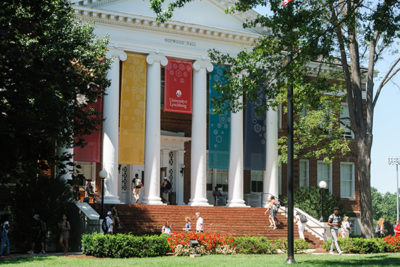In a campuswide email on Monday, President Kenneth R. Garren and President-elect Alison Morrison-Shetlar announced concrete plans to return to in-person instruction and reopen the University of Lynchburg for the fall semester on Aug. 12.

As recommended by the University’s Opening’s Task Force, there will be a gradual, phased return of staff and faculty over the summer, and in-person classes will end shortly before Thanksgiving. The plan focuses on three key areas: academic calendar, class scheduling, and course delivery; public health and safety; and residential life and extracurricular activities.
The ongoing planning effort involves multiple working groups from various campus departments, guided by information from the Centers for Disease Control, the governor’s office, the American College Health Association, and the Virginia Department of Health.
While the plan offers “detailed safety measures and protocols in all areas,” it’s equally important to note that there is “a great degree of flexibility should we experience coronavirus cases here on campus or a surge in cases in the state or region,” Garren and Morrison-Shetlar wrote in the email.
Academics
The fall semester will begin about a week early on Aug. 12 and conclude on Nov. 24 following several days of final exams. The shortened calendar eliminates fall break and ends just before Thanksgiving, when students will leave campus for an extended semester break. Students will begin spring semester classes on Jan. 25, 2021.
“This calendar seeks to minimize travel and mitigate the possibility of students transmitting the virus traveling to and from campus,” Garren and Morrison-Shetlar said.
The compressed calendar doesn’t apply to graduate health sciences programs that operate on a 12-month cycle, or to graduate programs that are normally offered online. Some students — those involved with clinical placements, student-teaching, internships, and athletics — will be allowed on campus after Thanksgiving.
Fall courses will be delivered both in class and online. All classes will be designed with a contingency to move online quickly should the University need to curtail normal operations due to a surge in COVID-19 cases.
Faculty are developing hybrid models “to suit the needs of different types of classes, with the nature of the class and pedagogy driving the hybrid format chosen for course delivery,” the presidents said.
Public Health and Safety
Best practices for reopening and sustaining a safe residential campus model are laid out in a plan developed by the University’s public health planning group. Reviewed by Centra, these best practices will be updated and communicated as information becomes available.
Details of the plan will be available on the COVID-19 web page in the Openings section. Key points include:
- Campus will reopen in a phased approach.
- Each department is responsible for developing and implementing an opening plan following the University-wide public health plan to mitigate risk of infection.
- PA Medicine, Nursing, and the Master of Science in Athletic Training (MSAT) programs will begin classes during Phase II, starting in June. A return to campus for other students during Phase II depends on current guidelines from the governor’s office.
- The health and safety plan outlines monitoring protocols that include the completion of COVID-19 screening by all students, faculty, and staff; daily symptom screening and temperature checks; and mitigation strategies. The plan also allows for employees to continue to work remotely and ensures that adequate supplies are readily available.
- The plan also includes protocols for containment and surveillance, as well as recommendations for managing a local rebound of COVID-19.
Residence Life and Extracurricular Activities
“The behavior of individuals will be critical to our safe reopening, and modifications to student interactions and the student experience are important concerns,” Garren and Morrison-Shetlar said.
The Office of Student Development followed the higher education guidelines outlined by the CDC and ACHA to formulate a plan that addresses residential spaces, the possibility of quarantine and isolation, common spaces, access to campus facilities, guests and gatherings, extracurricular activities, and programming.
“The safety of students residing on campus is of vital importance,” Dean of Student Development Aaron Smith said. “As such, housing assignments will be modified and additional opportunities for single-room occupancy will be created across campus.”
In addition, several areas have been designated as quarantine and isolation spaces to house students who contract the virus.
Other modifications to residence and campus life include:
- Maximum capacity for common spaces, masks or face coverings, social distancing, and the removal of lounge furniture to discourage gatherings
- Access and egress modifications in accordance to CDC guidelines, with doorways identified as entry- or exit-only.
- Elevators will be limited in use and residential students will only be permitted access to their individual residences.
- Guidelines regarding guests and gatherings to reduce the potential for congregation include: no more than 10 people gathered in one place and a limit of one guest per resident at any given time.
- Modified extracurricular activities and programs: Reservations of spaces for small-group gatherings, social distancing for all gatherings, additional livestream options for meetings and gatherings, and limited use of larger spaces. Guidelines for intramural sports, fitness activities, and outdoor leadership have been developed in collaboration with Athletics.
A complete University opening plan, and individual plans for each area, will be published on the COVID-19 web page.

